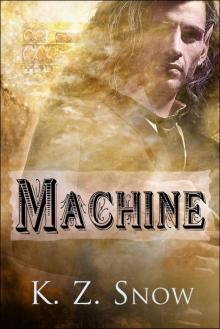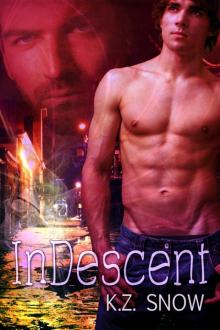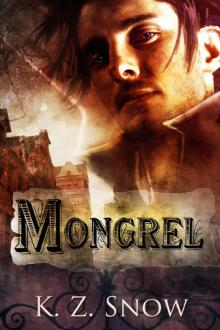- Home
- K. Z. Snow
Ben Raphael's All-Star Virgins
Ben Raphael's All-Star Virgins Read online
Introduction
I NOW know what drove us. We were looking for a fast track to self-acceptance and the secure, quiet kind of pride that comes with it.
In other words, need drove us. And probably a need we didn’t fully realize we had.
Some kids are natural achievers, motivated from within. They do well regardless of what their parents, teachers, and peers think of them. The rest of us—more fragile and desperate, I guess—are convinced we have something to prove. See? I’m worthwhile because I get good grades. Or because I’m attractive. Or because I can knock the hell out of a puck or ball.
Or because this sexy, sophisticated person wants to spend time with me.
I know something else too. Pride that depends on the approval of others is a false pride, layered on from outside yourself like gold leaf. When the leaf begins to flake and chip, you see the base material beneath it. When you see the base material, the shiny deception exists no more. What are you left with?
Soul-crushing disillusionment. A sorrow that seems absolute.
Sure, other people’s regard, if it’s genuine, can act like the ancient philosopher’s stone. It can help transform the base material into solid gold. But in the end, you are the alchemist who brings the necessary steps and components together. No one else can perform the magic for you.
I didn’t learn these truths on my own. I’m not some brilliantly insightful guy like the Dalai Lama. And if I am working my way toward true contentment with my life, I sure as hell have plenty of people to thank for it.
This is as much their story as it is mine.
Jake McCullough
Ben Raphael Academy, Class of 2015
Chapter One
LET ME make one thing clear from the start. I never saw any particular advantage or disadvantage to my virginity. I haven’t worked at keeping it and haven’t worked at losing it. My hormones have never exactly gushed toward the girls of Hammond Hall, who are the only girls in my vicinity for most of the year. But those girls obviously mattered to Brody Tarlech, who devised a plan to get their attention. The rest of us went along with it for reasons of our own.
The basis of his scheme was this: Brody seemed convinced virginity was an essential component of “mystique,” and having mystique was the way to get noticed.
Why did Brody assume we were all virgins? Because he thought he knew us. We five guys had met two years earlier, when we were fourteen-year-old freshmen living on the same floor of Bolger Hall at the Ben Raphael Academy, and we’d become inseparable. Brody must’ve figured if any of us had made the miraculous leap from minor to major league, everybody else would’ve heard about it.
Which wasn’t necessarily true. We all had our secrets.
I wasn’t sure of anybody’s status but my own. And, yeah, I qualified.
Brody presented his brainstorm in the dining hall one day in late January. My four buds and I sat at “our” table, a round table near the bank of patio doors that led outside to the quad. Sunshine reflecting off the snow laid bright patches on our food trays. Light glimmered on the ruffled edges of lettuce, picked out the white dots of oatmeal in the meatloaf, slid down the slopes of mashed potatoes and buttered green beans.
The sunshine was deceptive. Bitter cold lurked beyond the cafeteria walls. Inside, where it was almost too warm, the chatter of other first-lunch students bounced between red brick pillars and cream-colored walls. No cell phones chimed. Phones were banned during mealtimes as well as in classrooms.
Carlton Cummings, who always snacked more than ate full meals (Rider Hearn called him a “chronic nosher”), had just pulled off a line of string cheese and was dangling it over his mouth like an intestinal worm. His eyes shifted toward a sophomore girl named Amber as she walked past our table, and he held his pose while wiggling the string. I think he was trying to snag Amber’s attention, maybe planned on winking at her. I don’t know. Getting someone to look at you while your mouth is wide open, food scraps stuck between your teeth and milk residue coating your tongue, doesn’t strike me as the best way to make a good impression. Anyway, Amber couldn’t be bothered sparing Carlton even a split-second glance. She cruised right on by. Sighing, he finally dropped the string into his mouth and immediately started choke-coughing.
While Tim Burnett slapped Carlton on the back, Brody shook his head, I laughed, and Rider’s smile expanded.
All the guys in the group were my friends, but Rider was my best friend. I talked to him and trusted him the most. We were roommates, so it sort of made sense. He was more worldly than the other guys and always seemed, behind his mysterious half smiles, to be thinking about things that would never have occurred to the rest of us. Guess I’d been crushing on him a little since freshman year, because he was good-looking, too.
Okay, more than good-looking. Rider was becoming man-handsome. I’d noticed that at the beginning of the school year, as if his boyishness had peeled away over the summer like sunburned skin. Every time I glanced at him now—saw his sleek muscles and long, dark hair and penetrating eyes—something seemed to shift inside me.
Which might’ve explained why I wasn’t interested in the girls of Hammond Hall.
I didn’t spend time analyzing it, though. Why bother? So I looked up to Rider and enjoyed his company. So I was going through a phase. So what? It was easy for crap like that to happen when you were young and spent so much time around dudes.
“You know what we need?” Brody shoved his tray aside and rested his arms on the table.
“A brain,” Tim said, pointing sideways at Carlton.
Rider lifted his chin in my direction. “Courage.”
“A heart,” I responded, looking into his eyes. In this light, they were the color of sunflower honey. The tops of my ears suddenly felt on fire. Why had I said that? Why had Rider said what he’d said?
Oh yeah. The Wizard of Oz.
“Mystique,” Brody pronounced.
I had no idea what he was talking about, but at least he’d jerked my mind away from that weird exchange with Rider. I looked around the table. Our friends didn’t seem to know what Brody was talking about either. As if on cue, they frowned in unison.
“Huh?” Carlton said. He wasn’t the most eloquent guy.
“We’re all sort of invisible, right? The chicas don’t seem to know we exist. They look right through us. Everybody looks right through us.”
Brody was right. Even among us privileged Rafies, and even though we all had to dress essentially the same way five days a week, a caste system existed. There were cliques, some much cooler than others, and aloof loners, and clingy couples. There was a snooty fraternity and an equally snooty sorority, although they didn’t have their own houses. There were popular kids and scorned kids and generally overlooked kids who blended into lockers and desks. Our gang was in the last group… although Rider was getting more than vacant glances this year.
The girls seemed to have abruptly discovered him, as if he were one of those optical illusions in which an ordinary sketch turns into a frightening or bewitching image you hadn’t expected to see. Not that they were flocking around Rider—he still preferred keeping a low profile and therefore didn’t come off as very approachable—but the heightened level of interest was obvious from their stares and whispers.
“Invisibility has its benefits,” Rider said. He wiped his mouth and tossed the napkin on his tray.
“Not if you want to get laid,” Brody countered. “And not if you want to be in the top ten percent of your graduating class. It’s the dudes who stand out that are always hooking up and always scoring As and shit.”
“Denicke and Mathers stand out,” Tim said, “and you can bet they aren’t getting As.” He lifted his carton o
f chocolate milk and drew on the straw he’d stuck inside.
“I mean stand out in a good way, not like some shit-for-brains punk.”
Rider’s chair briefly screeched across the floor as he pushed back from the table. Arms crossed over his chest, he said to Brody, “Define ‘good.’”
I checked the wall clock. Fourth-hour classes would be starting in nineteen minutes. Although I was curious about what Brody was getting at, I wasn’t curious enough to risk another detention for tardiness.
“‘Good,’” Brody explained, “as in being well groomed—always looking great and smelling great. ‘Good’ as in having poise and self-assurance, but not in a puffed-up way like those hockey jocks and frat boys. If you want to be seen as superior, you have to be subtle about it.”
“Would help to know how to dance too,” Carlton offered glumly.
Brody agreed. The Valentine’s Day dance was coming up. It was one of those Sadie Hawkins things where girls invited guys. None of us had ever been invited before.
Tim and I were pretty good dancers—I’d always loved ice skating and roller blading, which might’ve helped—but Brody moved like a zombie on the dance floor, Carlton moved like a spaz, and Rider didn’t dance at all. He always hung back and watched, drinking punch and smiling in amusement.
I checked the clock again and finally spoke up. “Brode, get on with it, man. Second lunch is gonna start soon.”
He glanced at the clock to verify, then leaned forward and lowered his voice. “Okay, here’s what I think. The best way to get girls’ attention, the e-fectivo supremo way, is to be irresistible and a virgin. Nobody has more mystique than a desirable virgin. That’s why women have fantasies about banging priests.”
Carlton looked dumbfounded. “Ew,” he finally said. The rest of us burst out laughing.
“And here’s another thing,” Brody went on, raising his voice to be heard. “This place is big on personal integrity and discipline and all that kind of shit, so we’d be the darlings of teachers and administrators too. Not many dudes our age are, like, models of purity and high standards. The Man’s gonna think we’re pretty exceptional to show so much self-control and be proud of it.”
“Which man?” Carlton asked, which refreshed our laughter.
Brody rolled his eyes.
“So we do… what?” Tim said. “Shower twice a day and go for the slicked-back-hair thing and douse ourselves in Polo Red? And then we swagger around like John Travolta in Saturday Night Fever?”
“As long as I don’t have to swing a paint bucket,” Rider said.
The image made me snigger.
Tim embellished the picture. “And then, just as a reminder, we can all wear signs that say ‘I am awesome and I am a virgin. You know you want me.’”
That did it. I laughed harder until I had to use my napkin to wipe my eyes. Everybody was cracking up. Even Brody chuckled grudgingly.
“You’ll have to leave me behind,” I managed to get out. “I’m allergic to cologne.”
Grinning, Rider tousled my hair. “And this mop is allergic to ‘slicked back.’”
I pulled away but couldn’t deny what he’d said. I had a head full of untamable curls the color of aged copper. Grooming products sprouted legs and left the building when they came near my head. Rider thought my hair was “cuter than a dressed-up parrot” and said people teased me because they were envious—girls and guys. I was skeptical, to say the least, but I finally took his advice and more or less stopped stressing about it. The alternatives, which amounted to continually shaving off, straightening, and/or coloring my locks, were too costly and too much of a hassle.
Brody assessed me with a look. “You know, McCullough, you are kind of naturally cute, but you don’t make it work for you.”
“And how do I do that?”
“Attitude,” he pronounced. “You slouch around here like you don’t want to be seen. Walk tall, bro. Show the world you’re proud to be you.”
“I can only walk as tall as I am.” Which was an unimpressive five foot six. “Besides, what guy wants attention when he’s the twin of Orphan Annie?” I lifted my backpack off the floor and prepared to head for American history class.
Rider turned to me. “He has a point, Jake. You act like you’re ashamed of yourself, and you have absolutely nothing to be ashamed of.”
“Because you’re a good boy,” Tim said in the same way people talk to their dogs. He got up and patted me.
I wasn’t offended. Tim was droll, and I was used to it. We all were used to it. He was actually a pretty funny guy.
“Go dunk your head,” I told him. Tim had fine, straight hair, and in the dry months of winter, static electricity made the blond filaments drift away from his scalp. “It looks like you’re trying to contact the mother ship.”
“Free me from my bondage,” he said, mimicking an electronic voice.
The rest of us rose from the table. Brody, the dreamer of dreams and schemer of schemes, clearly hadn’t finished his spiel, so he announced, “We’ll pick this up later, okay? I’m telling you guys, it’s gonna work.” He shrugged on a lime-green down jacket that made him look like Dipsy the Teletubby. A knit cap with earflaps and a tail coming out of the top completed the resemblance.
We lifted our trays and carried them to the “scrap bins,” a genteel term for garbage cans. Local farmers came by every day to collect our refuse, which they fed to their chickens and pigs. The kitchen had its own bins where the cooks tossed eggshells and vegetable peelings and bruised fruit—anything suitable for the compost heap near the gardens.
Ben Raphael Academy was big on going green.
“But how is it going to work?” I asked Brody. I was just intrigued enough to want to hear more. “I mean, the makeover part shouldn’t be too hard, but how can we spread the word that we’re… what you think we are?”
“Without inviting an ass kicking,” Rider added.
I hadn’t thought of that, but it was a real possibility. Guys our age didn’t brag about their virginity. If anything, they lied in the opposite direction. Our “mystique” could be seen as a cause for justifiable harassment. Every school, even exclusive ones, had its bullies.
“Relax,” Brody said. “We’ll talk about it later. I got it all figured out.”
Chapter Two
EVEN IN winter, I liked walking around campus. I liked the serenity of it—the acres upon acres of woods and trails, the expanse of glimmering water, or gleaming ice, right at our doorstep. Not that I had an opportunity to ramble after lunch, but I still enjoyed the sight of all those frosty trees crowded together in the near distance like bundles of lace. The buildings, spaced carefully within an enormous clearing, looked like a gentrified frontier outpost. And in a way, that’s what our school was.
Ben Raphael Academy was located on Green Bay in northeastern Wisconsin. It wasn’t on the scenic Door Peninsula side of the bay—a touristy place, where property had been stupid pricy for decades—but on the northwestern shore near Peshtigo, a town that lent its name to the worst fire in American history. We learned about it as freshmen, during orientation week, and even took a field trip to the Fire Museum and town cemetery.
The school’s website and promo material were full of pretty pictures and even prettier promises: to build character, foster citizenship, and prepare for college and careers; to ensure that “virtue + vision = victory.” What Tim called “pithy quotes” from famous people were scattered among the photos and hype. I guessed they were supposed to give the school’s mission an extra polish of credibility.
BR had separate boys’ and girls’ dorms, one on either side of the quad. Covered walkways led to the cafeteria/dining hall, which was situated roughly between them. I rarely used these tunnels because I found them smelly and noisy. I liked fresh air and quiet. The classroom and administration buildings, theater and gymnasium, staff residences and other structures were loosely clustered around and behind the dormitories. BR had its own docks and boathouse too, and indo
or and outdoor sports facilities.
The buildings were almost all red brick with white-and-black trim. Rider had once described them as the illegitimate children of Georgian and Federalist styles.
Our parents paid through the nose for all this picture-postcard perfection, except those parents whose kids got scholarships. One was awarded each year to a girl, and one to a boy. Rider could easily have qualified for a scholarship—he was wicked intelligent, although something of an underachiever—but his father was too rich.
Most of our parents thought we, their kids, were akin to alien creatures—strange, gifted, disappointing, vaguely threatening, or simply a pain in the ass. As a rule, they were either suffocating or distant. Because of the way our families saw us, many Rafies also spent their summers on campus. That was costly too.
I should clarify. Many of the guys spent their summers on campus. The girls seemed to have fewer issues with Mommy and Daddy. Last year, when I’d wondered aloud about this, Rider had immediately come up with an explanation: “They’re princesses, so they’re missed. The castles are empty without them.”
At which point, I’d asked facetiously, “Aren’t the castles empty without us princes?”
And he’d replied, “Sure they are, but it’s a good kind of empty. We’re more trouble than we’re worth.”
That answer dovetailed with something Rider had told me in our freshman year. When I’d asked why his parents had sent him to school so far from their home in Connecticut, he’d answered, “That was the whole point.” The only reason he hadn’t spent the previous summer at Ben Raphael was that he’d had to housesit while his parents and little brother traveled.
We generally didn’t like talking about our families. Black sheep rarely did. Besides, I was an only child so I didn’t have much of a family to talk about.
I knew what my issues were, and we all knew what Tim’s were. I could only infer the other guys’ problems through comments they’d made over the years. Brody resented living in the shadow of his three accomplished brothers. It depressed him too, although he tried not to show it. Carlton’s parents had always badgered him about being stupid and a loser. As far as I was concerned, he was neither. Carlton was just an unmotivated goof like millions of other guys our age. Rider… well, his situation was murkier. He was guarded; he wasn’t careless enough to drop clues.

 Xylophone
Xylophone The Prayer Waltz
The Prayer Waltz Machine
Machine Bastards and Pretty Boys
Bastards and Pretty Boys InDescent
InDescent Mongrel
Mongrel Ben Raphael's All-Star Virgins
Ben Raphael's All-Star Virgins Fire-and-Water Gate
Fire-and-Water Gate Jude in Chains
Jude in Chains